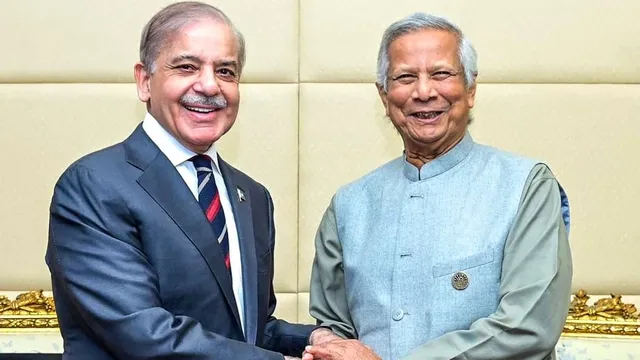- By Supratik Das
- Fri, 25 Jul 2025 01:07 PM (IST)
- Source:JND
Relations between Pakistan and Bangladesh have entered a new phase as the two South Asian neighbours have agreed to allow visa-free entry for holders of diplomatic and official passports. The landmark decision is being closely monitored by India, which has raised concerns about its potential implications for national security, particularly along its sensitive eastern and northeastern borders.
The pact was made public on Wednesday following extensive talks in Dhaka by Pakistan's Interior Minister Mohsin Naqvi with Bangladesh's Home Affairs Adviser, retired Lieutenant General Jahangir Alam Chowdhury. In accordance with Radio Pakistan, the meeting centered around enhancing cooperation on internal security, law enforcement, counter-terrorism, and police capacity building. “A significant breakthrough was achieved on the facilitation of visa-free entry for holders of diplomatic and official passports, and both countries reached a principled agreement on this matter,” Pakistan’s Interior Ministry said in an official statement cited by Dawn. However, no implementation date for the visa exemption has been announced yet. This development comes amid a noticeable thaw in bilateral ties between Islamabad and Dhaka following the formation of Bangladesh’s interim government under Nobel laureate Muhammad Yunus. Yunus, 84, has become an outspoken critic of former Prime Minister Sheikh Hasina's India-friendly policies. The new interim government in Dhaka is perceived as more inclined towards re-engagement with Pakistan to rebalance historically cold relations since the 1971 Bangladesh Liberation War.
Chowdhury termed the negotiations as an "important milestone" in the revival of Pakistan-Bangladesh relations. "I wholeheartedly welcome my brother upon his arrival in Dhaka. Your visit is of great importance for promoting Pakistan-Bangladesh relations," Chowdhury stated while expressing gratitude for Pakistan's proposal of supporting police training. In follow-up to the new understandings, both nations have agreed to form a joint committee, headed on the Pakistani side by Interior Secretary Khurram Agha. The committee would handle the implementation of visa-free travel for officials and other fields of cooperation. A high-level Bangladeshi delegation is also scheduled to visit Islamabad to learn about Pakistan's Safe City Project and the National Police Academy with a view to adopting best practices. The two ministers also vowed closer cooperation in combating drug trafficking, human smuggling, and extremism. "Both sides evinced a keen desire to enhance cooperation in areas of priority such as counter-terrorism, countering drug trafficking and countering human smuggling," Pakistan's Interior Ministry stated.
ALSO READ: Bangladesh Gopalganj Violence: ICRF Urges UN Probe, Alleges Attack On Bangabandhu Graveyard | Video
India Raises Security Red Flags
According to a report by the Economic Times, the move has raised security issues in New Delhi. Indian intelligence communities cited by the Economic Times are concerned that visa-free travel for Pakistani officials may enhance easier entry of Inter-Services Intelligence (ISI) operatives into Bangladesh. Security analysts cited by the Economic Times have warned that this could bring back anti-India Islamist extremist organisations and offer new support to insurgent groups based in India's northeastern region. As per a report by the Economic Times, India has already placed its border authorities on high alert to watch out for any heightened activity along the open eastern border. In May, Pakistan's Bangladesh High Commissioner, Iqbal Hussain Khan, had also said that the two countries were trying to ease the visa regime for business communities to enhance trade relations, raising more eyebrows in India's strategic establishment.
The new pact between Islamabad and Dhaka arrives during a period when regional dynamics in South Asia are undergoing a change, with small nations wanting to balance relations between India and its traditional foes. Although no official reaction has been made as yet by the Ministry of External Affairs in New Delhi, India may increase diplomatic overtures to make sure its interests in Bangladesh continue to be protected. As the game unfolds, India will likely monitor closely further cooperation between Pakistan and Bangladesh, more so in sensitive areas such as interior security and police training.

